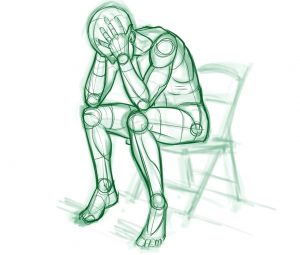In simple terms, a mood disorder and in broader terms, a mental disorder, depression has become very common these days. Depression is a common health problem that causes low mood and less interest in performing something. Depression can be genetic or acquired and many of the situations can act as the causes of depression.
Listened about the adverse effect of depression with the suicide of Sushant Singh Rajput, has melted the hearts of many people all around the world. It is very important for youngsters and adults to take care of their mental health. For that, it is crucial to understand and know all about depression, including causes, symptoms, and treatment. So, in this article, we’ll discuss the details and concepts of depression.
According to the World Health Organization (WHO), more than 264 million people of different ages suffer from depression, globally.
What is Depression?

Depression is a typical and genuine medical sickness that adversely influences how you feel, the manner in which you think, and how you act. Luckily, it is likewise treatable. Depression causes feelings of intense sadness which includes helpless, worthless, hopeless, or potentially lost interest in activities once delighted in.
It can lead to many physical, emotional issues and can diminish an individual’s capacity to function at home and at work. Depression is a continuous issue, not a passing one. It comprises of scenes during which the side effects keep going for at least fourteen days. Depression can keep going for weeks, months, or years.
Causes of Depression
There are various elements that may build the opportunity for depression. It can range from biological to circumstantial.
- Abuse – Any past sexual, psychological, or physical misuse can increase the chance of depression further in their life.
- Conflicts – Depression may result from a personal fight with family or friends.
- Genetics – A family history of depression can increase the risk of developing depression or any other psychiatric disorder.
- Drug Use – A few medications for eg isotretinoin, corticosteroids, interferon-alpha can increase the risk of depression.
- Brain Structure – If the frontal lobe of your brain is less active then there is a greater risk for depression.
Other Causes Includes:
- Low confidence
- Overconsumption of Certain drugs
- Unpleasant occasions, for eg loss of a friend or family member, money issues, or a separation.
Sign and Symptoms of Depression
Despite the fact that depression may happen just a single time during your life, individuals experience a number of episodes. During these scenes, symptoms happen mostly every day and may include:
- Feelings of irritability, restlessness, aggressiveness, anger, anxiousness.
- Loss of joy or interest in most or every single normal action, for example, hobbies, sex, sports.
- Disturbance in sleep, sleeping too much or too little.
- Nervousness, anxiety, or agitation.
- Physical pain cannot be explained, such as headaches, back pain, or muscle pain.
- No fear of death causes frequent thoughts of death, suicide, suicidal thoughts, suicide attempts.
- Inconvenience thinking, settling on choices, concentrating, and recollecting things.
- Decreased hunger and weight loss or increased desires for food and weight gain.
- Decreased energy, so even little work requires extra effort.
- Feelings of guilt or worthlessness
For some individuals with depression, symptoms typically are sufficiently extreme to make it noticeable in their daily activities.
The demand of the present time is – “Keep your mental health at the highest priority.”
You can also watch this video to know more about the Signs & Symptoms Of Depression –
Treatment of Depression
Living with depression can be troublesome, yet treatment can help improve your quality of life. Talk to your doctor about your problem and about possible options.
You may effectively manage symptoms with one type of treatment, or you may locate that a combination of treatment works best. Its good to combine medical treatment and different therapies, include the following:
Treatment usually comprises of three components:
1. Medication Treatment
Antidepressants can help treat moderate-to-extreme depression. A few classes of antidepressants are available:
- Tricyclic antidepressants
- Atypical antidepressants
- Selective serotonin and norepinephrine reuptake inhibitors (SNRIs)
- Monoamine oxidase inhibitors (MAOIs)
- Selective serotonin reuptake inhibitors (SSRIs)
Each antidepressant acts on a combination of neurotransmitters or on a different neurotransmitter. An individual should just accept these medicines as their doctor prescribes. A few medications can require a long time to have an effect. By stopping the medication, an individual may not experience the advantages that it could offer.
A few people quit taking medications after symptoms improve, yet this can lead to reoccurring. Raise any worries about antidepressants with a specialist, including any goal to quit taking the medications.
2. Psychotherapy
Mental, or talking, treatments for depression incorporate CBT, interpersonal psychotherapy, and critical thinking treatment, among others. For certain types of depression, psychotherapy is typically the mainline treatment, while a few people react better to a combination of psychotherapy and medications. CBT and interpersonal psychotherapy are the two primary kinds of psychotherapy for depression. An individual may have CBT in sessions with a therapist, in gatherings, via phone, or on the web.
3. Support
Support from the family and loved ones is very important as it can range from discussing the problems and their practical solutions and possible cause so as to educate the family member and friends that always take care of the person and never leave the person all alone.
Besides the above three, some other treatments are:
-
Brain Stimulation therapies
Brain stimulation therapies are another treatment choice. For example, transcranial magnetic stimulation sends magnetic pulses to the cerebrum, and this may assist treat with majoring depression.
-
Exercise
Aerobic exercises raise endorphin levels and stimulate the neurotransmitter norepinephrine, which is connected with a state of mind. This may help diminish mild depression.
Winding Up
Depression can be a long term challenge or it can be temporary. Treatment doesn’t always cure your depression. But treatment makes your symptoms manageable. You can manage your symptoms by finding the right combination of therapies and medications. And if the treatment doesn’t work, talk to your doctor. They will be going to change your treatment plan according to your condition and symptoms.
So, in the present time of stress and load, it is important to take care of your physical as well as mental health. Get aware of the depression, it’s causes, symptoms, and treatment to keep yourself fit and healthy!

























